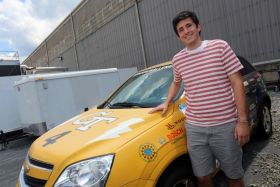Aug 5 2014
A team of about 35 undergraduate and graduate students is about to embark on an ambitious four-year project to redesign a Chevrolet Camaro into a hybrid-electric car.
 A team of students from Georgia Institute of Technology is participating in the latest Advanced Vehicle Technology Competition, EcoCAR 3. Justin Wilbanks, a graduate research assistant in the George W. Woodruff School of Mechanical Engineering, is a member of the new team and is pictured with the car Georgia Tech designed for an earlier competition.
A team of students from Georgia Institute of Technology is participating in the latest Advanced Vehicle Technology Competition, EcoCAR 3. Justin Wilbanks, a graduate research assistant in the George W. Woodruff School of Mechanical Engineering, is a member of the new team and is pictured with the car Georgia Tech designed for an earlier competition.
Georgia Institute of Technology is one of 16 universities participating in the Advanced Vehicle Technology Competition, EcoCAR 3. The U.S. Department of Energy and General Motors Company are among the sponsors.
The teams are tasked with developing and implementing an innovative vehicle powertrain that will lower emissions by incorporating alternative fuels. They must keep the Camaro’s body design, retain safety standards and maintain consumer satisfaction with performance and cost.
“It is a great opportunity to develop our own vehicle based on our own innovation,” said Justin Wilbanks, a graduate research assistant in the George W. Woodruff School of Mechanical Engineering. “This is real-world experience while we’re still in school. And it’s exciting to know we’re going to work on a Camaro.”
Wilbanks was among a group of undergraduate and graduate students and faculty who worked on Georgia Tech’s application for the competition.
When the fall semester starts later this month, students will begin work on their overall design concept. They will receive a new Camaro during fall 2015 and continue to work on the car through 2018.
Students applied for membership on the team through Georgia Tech’s Vertically Integrated Projects (VIP). The program allows undergraduate and graduate students to work on multidisciplinary projects that can last for years.
Three advisors will work with the team: Tom Fuller, professor in the School of Chemical & Biomolecular Engineering; Michael Leamy, associate professor in mechanical engineering; and David Taylor, professor in the School of Electrical of Computer Engineering.
The other 15 competing institutions are: Arizona State University, California State University (Los Angeles), Colorado State University, Embry-Riddle Aeronautical University, McMaster University, Mississippi State University, Ohio State University, Pennsylvania State University, University of Tennessee (Knoxville), University of Alabama, University of Washington, University of Waterloo, Virginia Tech, Wayne State University and West Virginia University.